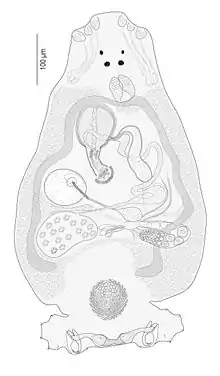Monopisthocotylea
The Monopisthocotylea are a subclass of parasitic flatworms in the class Monogenea. [1][2][3]
| Monopisthocotylea | |
|---|---|
 | |
| Echinoplectanum laeve, a member of family Diplectanidae | |
| Scientific classification | |
| Kingdom: | Animalia |
| Phylum: | Platyhelminthes |
| Class: | Monogenea |
| Subclass: | Monopisthocotylea |
Classification
There are only two subclasses in the class Monogenea:
- Monopisthocotylea. The name means "a single posterior sucker" - the attachment organ (the haptor) is simple.
- Polyopisthocotylea. The name means "several posterior suckers" - the attachment organ (the haptor) is complex, with several clamps or suckers.
The subclass Monopisthocotylea contains these orders:[1]
- Order Capsalidea
- Order Dactylogyridea
- Order Gyrodactylidea
- Order Monocotylidea
- Order Montchadskyellidea
Example of species
- Entobdella soleae, a capsalid from the sole Solea solea off the United Kingdom
- Gyrodactylus salaris, a gyrodactylid, or "salmon fluke", a deadly parasite of salmon in Norway
- Calydiscoides euzeti, a diplectanid from the emperor, Lethrinus rubrioperculatus
- Pseudorhabdosynochus epinepheli, a diplectanid from groupers, and many other species of Pseudorhabdosynochus
- Cichlidogyrus evikae and many other species of the genus Cichlidogyrus, which are parasites on the gills of cichlid fish
References
- WoRMS (2019). Monopisthocotylea. Accessed at: http://www.marinespecies.org/aphia.php?p=taxdetails&id=119219 on 2019-02-08
- Yamaguti, S. (1963). Systema Helminthum Volume IV Monogenea and Aspidocotylea: John Wiley & Sons.
- Hayward, C. (2005). Monogenea Polyopisthocotylea (ectoparasitic flukes). In K. Rohde (Ed.), Marine Parasitology (pp. 55-63): CSIRO, Collingwood, Australia & CABI, Oxon, UK.
External links
This article is issued from Wikipedia. The text is licensed under Creative Commons - Attribution - Sharealike. Additional terms may apply for the media files.